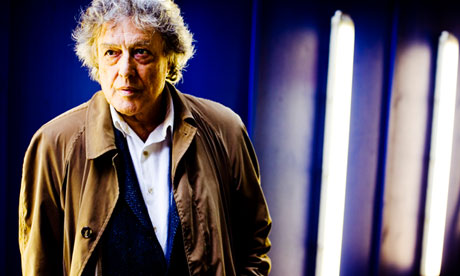
Playwright Tom Stoppard has been announced as the winner of the 2013 PEN/Pinter prize, celebrating a lifetime of literary achievement and his campaigning work in the field of human rights.
Founded in 2009 by the freedom-of-expression writers' group English PEN in Pinter's memory, the prize is awarded annually to a British writer or writer resident in Britain who, in the words of Pinter's Nobel literature prize speech in 2005, casts an "unflinching, unswerving" gaze upon the world and shows a "fierce intellectual determination … to define the real truth of our lives and our societies."
Stoppard was born in Zlin, Czechoslovakia in 1937, and moved to England with his mother at the age of 9. In 1966 his first full-length play, Rosencrantz and Guildenstern Are Dead, debuted at the Edinburgh fringe, and made him an overnight sensation when it was staged by the National Theatre the following year.
In the decades since, Stoppard's debonair and often brilliantly intellectual plays have made him a household name on both sides of the Atlantic: initially with 1972's Jumpers, which riffed on moral philosophy, and 1974's Travesties, which numbered among its cast list Lenin, Joyce and Tristan Tzara, and later with plays including The Real Thing (1982) and Arcadia (1993).
In recent years Stoppard's productions have included the epic trilogy The Coast of Utopia, which opened at the National in 2002 before transferring to Broadway, and Rock'n'Roll (2006), which reflected on changing life in post-communist eastern Europe, as well as translations of Chekhov and Pirandello.
Stoppard has also been involved in a number of high-profile campaigns for human rights, most recently his support for Belarus Free Theatre.
Gillian Slovo, chair of the judges, said in a statement: ''The judges agreed unanimously that Tom's lifetime's work meets the challenging criteria set by Harold Pinter when he described those characteristics he most admired in a writer, characteristics which English PEN shares in its campaigning and charitable mission: those of courage and truthfulness, a determination to tell things as they are.''
Stoppard said: "Harold was one of the reasons I wanted to write plays … He became and remained a model for the kind of fearless integrity which PEN exists to defend among writers, and most of us had occasion to feel humbled by his example.''
Stoppard will be presented with the prize at a public event at the British Library on Monday 7 October, at which he will deliver an address, later to be published in a limited edition by Faber and Faber.

